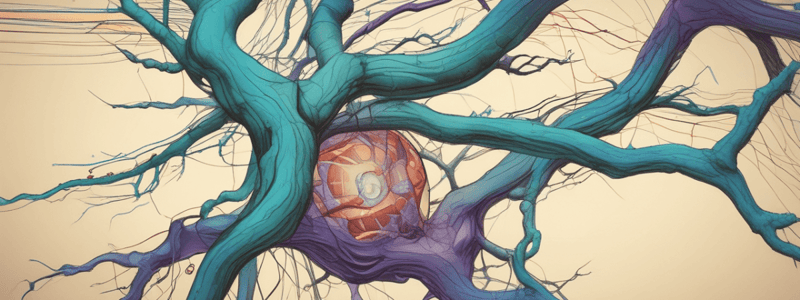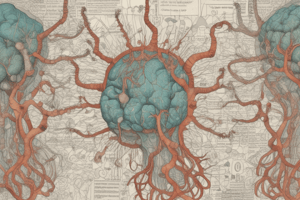Podcast
Questions and Answers
What is the primary purpose of voltage gated ion channels in synaptic transmission?
What is the primary purpose of voltage gated ion channels in synaptic transmission?
- To generate an action potential in the postsynaptic neuron
- To regulate the influx of calcium ions (correct)
- To activate the mobilization of synaptic vesicles
- To inhibit the release of neurotransmitters
What type of receptors are activated by GABA, resulting in an inhibitory postsynaptic potential?
What type of receptors are activated by GABA, resulting in an inhibitory postsynaptic potential?
- Metabotropic GABA receptors
- Ionotropic GABA receptors (correct)
- Ionotropic glutamate receptors
- Metabotropic glutamate receptors
What is the primary function of synaptic vesicles in synaptic transmission?
What is the primary function of synaptic vesicles in synaptic transmission?
- To inhibit the release of neurotransmitters
- To generate an action potential in the presynaptic neuron
- To store and release neurotransmitters (correct)
- To regulate the activity of ion channels
What is the primary mechanism by which ionotropic receptors regulate the flow of ions across the membrane?
What is the primary mechanism by which ionotropic receptors regulate the flow of ions across the membrane?
What type of potential is generated when glutamate binds to ionotropic glutamate receptors?
What type of potential is generated when glutamate binds to ionotropic glutamate receptors?
What is the primary function of calcium ions in synaptic transmission?
What is the primary function of calcium ions in synaptic transmission?
Which of the following receptors has a single polypeptide subunit with 7 transmembrane alpha helices?
Which of the following receptors has a single polypeptide subunit with 7 transmembrane alpha helices?
What is the primary function of mGluRs of group II and III in the hippocampus?
What is the primary function of mGluRs of group II and III in the hippocampus?
What is required as a co-transmitter for the activation of uncharacterized presynaptic mGluR?
What is required as a co-transmitter for the activation of uncharacterized presynaptic mGluR?
Which of the following is NOT a characteristic of GABAB1?
Which of the following is NOT a characteristic of GABAB1?
What is the effect of GABABR activation on Ca2+ channels?
What is the effect of GABABR activation on Ca2+ channels?
What is the primary location of mGluRs of group I in the hippocampus?
What is the primary location of mGluRs of group I in the hippocampus?
What type of ions do NMDA receptors require for activation?
What type of ions do NMDA receptors require for activation?
What is the function of Mg2+ in NMDA receptors?
What is the function of Mg2+ in NMDA receptors?
What is the significance of the post-synaptic calcium permeability of NMDA receptors?
What is the significance of the post-synaptic calcium permeability of NMDA receptors?
What is the difference between AMPA and NMDA receptors?
What is the difference between AMPA and NMDA receptors?
What is the role of glycine in NMDA receptors?
What is the role of glycine in NMDA receptors?
What is the structure of GABA(A) receptors?
What is the structure of GABA(A) receptors?
What is the effect of propofol on GABA(A) receptors?
What is the effect of propofol on GABA(A) receptors?
What is the difference between ionotropic and metabotropic receptors?
What is the difference between ionotropic and metabotropic receptors?
What is the function of G-proteins in metabotropic receptors?
What is the function of G-proteins in metabotropic receptors?
What is the significance of long-term potentiation in synaptic plasticity?
What is the significance of long-term potentiation in synaptic plasticity?
Flashcards are hidden until you start studying
Study Notes
Neuron to Neuron Communication
- Action potential reaches the synaptic terminal, leading to local voltage changes across the membrane
- Voltage changes activate voltage-gated ion channels, resulting in an influx of calcium ions
- Calcium ions trigger the mobilization and fusion of synaptic vesicles with the cell membrane, releasing neurotransmitters into the synaptic cleft
Excitatory and Inhibitory Neurotransmission
- Glutamate activates postsynaptic ionotropic glutamate receptors, causing an excitatory postsynaptic potential (EPSP)
- GABA activates postsynaptic ionotropic GABA receptors, causing an inhibitory postsynaptic potential (IPSP)
Ionotropic Receptors
- Ionotropic receptors are ligand-gated ion channels, also known as neurotransmitter receptors
- Neurotransmitter binding causes a conformational change, opening the ion channel
- Examples: ionotropic glutamate receptors and ionotropic GABA receptors
Metabotropic Receptors
- Metabotropic receptors have one subunit with 7 transmembrane alpha helices (TM 1-7)
- The cytoplasmic loops interact with G proteins
- Examples: muscarinic acetylcholine receptors, adrenergic receptors, and metabotropic glutamate receptors
Metabotropic Glutamate Receptors (mGluRs)
- mGluRs of groups II and III are predominantly expressed on the presynaptic side, negatively linked to transmitter release
- mGluRs of group I are found postsynaptically
- Activation of presynaptic mGluRs increases transmitter release, requiring arachidonic acid as a co-transmitter
Ionotropic Glutamate Receptors
- Glutamate is the primary excitatory neurotransmitter in the mammalian brain
- AMPA and NMDA-type glutamate receptors are the main receptors involved
- NMDA receptors have a Mg2+ block, and their Ca2+ permeability is important for synaptic plasticity
Ionotropic Glutamate Receptor Structure
- Four transmembrane alpha helices (M1-M4)
- The Glu binding domain is encoded on the N-terminal
- The channel is formed by four subunits, surrounding the pore of the channel
- When open, the ion channel is permeable to Na+, K+, and in some cases, Ca2+
AMPA and NMDA Receptors
- AMPA receptors: fast sodium entry, fast EPSP, fast inactivation
- NMDA receptors: slow activation, Ca2+ permeability, stay open for a long time
- NMDA receptors require co-activators: glycine and D-serine
NMDA Receptor Kinetics
- Glycine (together with glutamate) is required for the activation of NMDA receptors
- NMDA receptors are readily blocked by magnesium (Mg2+)
- Ketamine selectively blocks NMDA channels
Molecular Integrators
- NMDA receptors act as molecular integrators, opening only when the membrane is already depolarized by AMPA receptors
- This allows Ca2+ to enter the cell, leading to synaptic plasticity, memory, long-term potentiation, and neuronal death
GABA Receptors
- GABA is the main inhibitory neurotransmitter in the vertebrate brain
- GABA binds to GABAA receptors with high affinity
- GABAA receptors have a pentameric structure with 5 subunits, an allosteric binding site for GABA, and a benzodiazepine binding site between alpha and gamma subunits
GABA Functions
- GABA(A) receptors contribute to several components of the anaesthetic state, including amnesia, sedation, hypnosis, and immobility
- GABA(A) receptors are substrates for some general anaesthetics
Propofol
- Propofol is frequently used for the induction of anaesthesia
- Propofol works by increasing GABA-mediated inhibition, decreasing the rate of dissociation of GABA from the GABAA receptor, leading to longer-lasting hyperpolarization of cell membranes
Studying That Suits You
Use AI to generate personalized quizzes and flashcards to suit your learning preferences.




